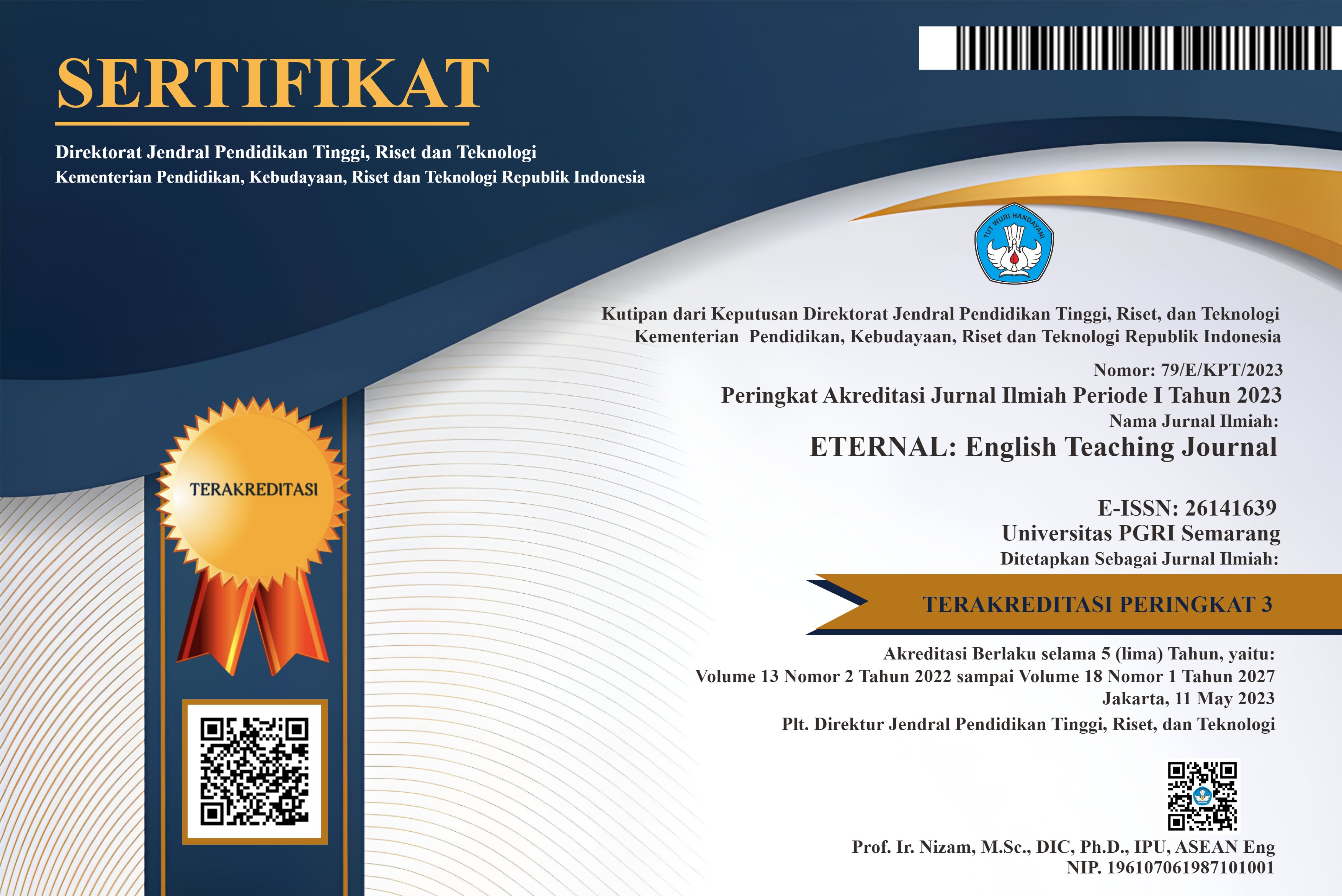The Use of Flashcards Through Umbul Game in Learning Vocabulary: Is It Effective?
DOI:
https://doi.org/10.26877/eternal.v15i2.745Keywords:
Learning Media, Flashcards, Game, VocabularyAbstract
Vocabulary is the basic thing needed to learn the foreign language. It is wording that people have to know to communicate well, both in written and spoken structures, especially for young learners. Children's language development depends on their vocabulary, which has an impact on their academic performance. This study aimed to understand why first-grade elementary students struggle with English vocabulary in the curriculum. The primary goal was to determine if using flashcards with the Umbul game improved English vocabulary for first-grade students. The design of the research is Classroom Action Research (CAR). There are four fundamental processes in Classroom Action Research (CAR). Those are planning, acting, observing, and reflecting. In accordance with planning, the researchers prepare teaching kits needed to take action, such as: lesson plans, observation sheet, materials to be used in the classroom action, and evaluation sheet. In terms of acting, researchers implement the plan after preparing lesson plans, materials and evaluations. In this research, the researchers apply flashcards through Umbul games in teaching vocabulary. The researchers also give the post-test. Concerning observing, the researchers observe the process of teaching and learning activity. The researcher also makes result sheet to take note the information that occur during the activity. Regarding reflection, the researchers reflect, evaluate, and describe to improve the condition in the next cycle. The subjects were first-grade students from SD Pangudi Luhur Don Bosko Semarang participated in class I-C research projects. In this study, observation and evaluation sheet were applied as instruments. On the other hand, the information was obtained from observation and evaluation sheets. Information examined throughout the study was quantitative. The data was collected, and then it was examined by the researchers. The findings indicate a significant increase in first-grade students' motivation to learn English vocabulary, from 7% before to 15% after using flashcards. After implementing the flashcards through the Umbul game, the statistics indicated that students were able to acquire vocabulary with ease and were actively engaged in the teaching-learning process in the classroom. With the use of flashcards through Umbul games, students become more engaged in their studies and are more motivated to learn English. The students will have opportunities to improve their English by employing this strategy. Additionally, the English teacher can provide up chances for student participation in class activities by using flashcards as illustrated media. Hopefully, these findings can serve as a reference for future research.
References
Abbasian, G. R. &Ghorbanpour, E. (2016). The effect of flash card-based instruction on vocabulary learning by EFL learners. Islamic Azad University.
Anggraini, R. D., Listyarini, I., & Huda, C. (2019). Keefektifan model picture and picture berbantuan media flashcard terhadap keterampilan menulis karangan. IJEE (Indonesian Journal of English Education), 3(1), 37. https://doi.org/10.23887/ijee.v3i1.17282
Asrori Rusman. (2020). Classroom Action Research. ISBN: 978-623-7699-73-6.
Broughton, Geoffrey, Christopher Brumfit, Roger Flavell, Peter Hill and Anita Pincas. (2003). Teaching English as foreign language. University of London Institute of Education.
Burns, A. (2010). Doing action research in English language teaching: A guide for practitioners. Routledge.
Cameron, Lynne. 2001. Teaching languages to young learners. Cambridge: Cambridge University Press. English Teaching Journal (ETERNAL), 5(1), 1-6. https: https://doi.org/10.26877/eternal.v5i1.1962
Chen, R. W., & Chan, K. K. (2019). Using augmented reality flashcards to learn vocabulary in early childhood education. Journal of Educational Computing Research, 57(7), 1812–1831. https://doi.org/10.1177/0735633119854028
Edward, David Allen & Rebecca M, Vallete. (1997). Classroom technique. Foreign language and English as a second language. Harcout Brave Javanovich.
Fidiyanti, L. (2020). Penggunaan media pembelajaran flashcard untuk meningkatkan penguasaan vocabulary dengan materi narrative teks. Journal of Education Action Research, 4(1), 44. https://doi.org/10.23887/jear.v4i1.23437
Fitriyana, N., Ningsih, K., & Panjaitan, R. G. P. (2020). Penerapan model pembelajaran savi berbantuan media flashcard untuk meningkatkan aktivitas dan hasil belajar. Edukasi: Jurnal Pendidikan. https://doi.org/10.31571/edukasi.v18i1.1667
Hamer, W. & Rohimajaya, N. A. (2018). Using flash card as instructional media to enrich the students’ vocabulary mastery in learning English. Journal of English Language Studies, 3 (2), 167-177.
Harefa, A. T. & Telaumbanua, K. M. E. (2022). An analysis of the effectiveness of flash card media. Journal of Management, 3 (2), 149-156.
Kemendikbud. (2022a). Kurikulum Merdeka Jadi Jawaban untuk Atasi Krisis Pembelajaran. https://www.kemdikbud.go.id/main/blog/2022/02/kurikulum-merdeka jadi-jawaban-untuk-atasi-krisis-pembelajaran
Khusniyah, N. L., & Hakim, L. (2019). Efektivitas pembelajaran berbasis daring: Sebuah bukti pada pembelajaran Bahasa Inggris. Jurnal Tatsqif, 17(1), 19–33. https://doi.org/10.20414/jtq.v17i1.667
Kornell, N. (2009). Optimising learning using flashcards: Spacing is more effective than cramming. Applied Cognitive Psychology. Department of Psychology. University of California.
Musyaffa, M. L. (2020). Flashcard as a media to improve students’ writing skill in descriptive paragraph. E-Link Journal, 7 (2), 83-97.
Parmawati, A., & Yugafiati, R. (2017). Using authentic material to improve students’ reading interest (A Classroom Action Research in the Second Semester Students of STKIP Siliwangi Bandung). ELTIN JOURNAL, Journal of English Language Teaching in Indonesia, 5(1), 1–8.
Permai, B., Clement, S., & Yunus, M. (2021). English teaching amidst the COVID-19 pandemic : Teacher issues and challenges community of inquiry ( COL ). Malaysian Journal of Social Sciences and Humanities (MJSSH), 6(5), 103–116. https://doi.org/10.47405/mjssh.v6i5.797 Malaysian.
Putra, I. N. A., Jampel, I. N., & Sudatha, I. G. W. (2018). Pengembangan multimedia flashcard untuk meningkatkan kemampuan menyimak di TK Negeri Pembina Singaraja. Edutech Undiksha, 6(1), 32. https://doi.org/10.23887/jeu.v6i1.20260
Rahmawati, C. & Utami, K. R. (2019). Improving students’ vocabulary mastery using flash cards. Professional Journal of English Education, 2 (6), 845-851.
Saeedakhtar, A., Haqju, R., & Rouhi, A. (2021). The impact of collaborative listening to podcasts on high school learners’ listening comprehension and vocabulary learning. System, 101. https://doi.org/10.1016/j.system.2021.102588
Sanjaya, Wina. 2013. Penelitian pendidikan: Jenis, metode dan prosedur. Kencana Prenada Media Group.
Trisnanti, I. A. N. L., Tirtayani, L. A., & Putra, I. K. A. (2018). Pengaruh media flashcard bilingual terhadap kemampuan kosakata Bahasa Inggris permulaan anak kelompok B TK Gugus Mawa. Journal Pendidikan Anak Usia Dini Undiksha, 6(3), 346. https://doi.org/10.23887/paud.v6i1.15200







